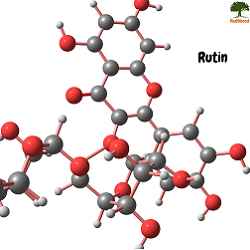Rutin (20th January 2022):
 Rutin is a bioflavonoid or plant pigment, that can be found in a variety of fruits and vegetables. Rutin is abundant in apples. Rutin can also be found in buckwheat, citrus fruits, figs, and black and green tea. Quercetin, an antioxidant with anti-inflammatory properties can be found in rutin. It also aids in the production of collagen and the utilisation of vitamin C by the body. Rutin can be added to your diet by consuming foods that contain it or by taking a supplement.
Rutin is a bioflavonoid or plant pigment, that can be found in a variety of fruits and vegetables. Rutin is abundant in apples. Rutin can also be found in buckwheat, citrus fruits, figs, and black and green tea. Quercetin, an antioxidant with anti-inflammatory properties can be found in rutin. It also aids in the production of collagen and the utilisation of vitamin C by the body. Rutin can be added to your diet by consuming foods that contain it or by taking a supplement.
Health Benefits of Rutin
Aids in blood circulation: Rutin has traditionally been used to enhance circulation. Rutin is supposed to strengthen and increase the flexibility of blood vessels like arteries and capillaries. Blood vessel strengthening can help you live a healthier life. This could assist with bruising, spider veins, and varicose veins, among other things. Rutin has also been shown to help in the treatment of haemorrhoids (vein swollenness) and the recovery from haemorrhoid ectomy surgery.
Prevents clotting of blood: Rutin has been shown in studies to prevent blood clots in certain animals. This suggests that rutin may help to prevent blood clots. Blood clot prevention can help reduce your risk of acquiring life-threatening illnesses like pulmonary embolisms, stroke, deep vein thrombosis and heart attacks. If you have a history of heart problems or blood clots or are taking blood thinners, you should talk to your doctor about using rutin supplements.
Reduces Cholesterol: Rutin has enough data to suggest that it can help decrease LDL cholesterol. People with diabetes who had a history of hypertension were given 500 mg of rutin once a day in one research. Participants’ plasma LDL cholesterol levels were determined to be lower by the researchers. The antioxidant properties of rutin, according to the study, are to blame.
Pain associated with arthritis is reduced: One of rutin’s most prevalent applications is to relieve arthritis pain. It aided in the suppression of oxidative stress in persons with arthritis. There’s also evidence that rutin can help people with arthritis improve their knee function.
Skin Protection: A topical lotion containing rutin improved skin suppleness and reduced the length, area, and quantity of wrinkles in 40 middle-aged persons in a clinical experiment. In the same study, rutin boosted collagen formation and reduced oxidative damage in skin cells. In general, flavonoids can protect against UV radiation. Rutin, in particular, could be employed in sunscreen. Rutin has a sun protection factor (SPF) of up to 30 when mixed with other substances in the lab.
Protection of the brain: Rutin is known for the protection ofthe brain. Rutin shielded rats suffering from a stroke from the negative effects of decreased blood supply to the brain. It may also help them remember things better and ensure the survival of critical brain cells in the memory hub of the brain (the hippocampus).
Controls Diabetes- People with diabetes can incorporate rutin in their diet or take rutin supplements. In diabetic rats, rutin protected the pancreas, reduced glucose, and boosted insulin levels. It aided in the restoration of normal levels of sugar reserves (glycogen) and sugar-breaking enzymes in the liver, as well as the reduction of fat stores.
Probable Side Effects
When ingested in the proportions found naturally in foods like citrus, onions, and apples, rutin is generally regarded harmless. Rutin supplements, on the other hand, can induce headaches, rashes, muscle tension, changes in heartbeat, a high white blood cell count, blurred vision, fluid accumulation in the knees, and an upset stomach. Side effects may fade as you get used to the supplement, but you should always consult your doctor before using it or if you have any problems. Before taking rutin supplements, discuss with your doctor if you have a history of heart disease or blood clots, or if you are on blood-thinning medicine or supplements. Rutin should not be taken by pregnant or breastfeeding women.
Dosage
There is insufficient scientific evidence to propose a rutin dose. In research investigations, several doses of rutin have been employed, and rutin is frequently mixed with other herbal substances. Your age, gender, and medical history may all influence the dose that is right for you. To get personalised advice, speak with your healthcare provider.
Final Thoughts
Rutin is a natural flavonoid that can be easily found in a wide range of fruits and vegetables. A wide variety of health benefits can be derived from the regular intake of rutin. It can also be consumed through supplements. It is advised to consult your healthcare practitioner before consumption of rutin supplements.
